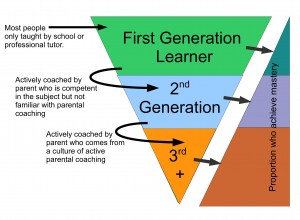
Parental coaching has great potential to benefit kids’ education. It has been mostly ignored by the education system, with the notable exception of reading. Parents are actively encouraged to read to their preschoolers and listen to their young school aged children read.
This came to mind recently in relation to music, where there is very little culture of parental coaching amongst my peer group. Most don’t have the skills themselves, and many of those who do have the skills are skeptical about their ability to positively contribute to their children’s music education.
So I’ve developed this diagram as a talking point for why I think that parents should put some thought into imparting specialist skills, like music, to their children.
In what I’m calling the first generation the learner has to pick up everything from professional teachers. Teachers’ time and attention is a scarce resource. The child often has to compete with other kids for attention. Lessons may be expensive. There are many hurdles on the way to mastery. Only a small proportion of first generation learners are able to realise their potential.
The second generation of learner has the active involvement of a parent in their education, even though that parent is still convincing themselves to get involved and experimenting with the best way to help.
Having a parent who has familiarity or even mastery of a subject does not automatically make you a second generation learner. Indeed, the institutionalisation of education has lead to a lot of waste with generation-after-generation of first generation learners in many areas.
On the other hand, if a parent sits in on music lessons in order to learn along and provide extra coaching, the child can receive the benefits of being a second generation learner.
A third generation learner is coached by a parent who was coached by their parent. While the parent of the third generation learner may not be a perfect coach, they do at least consider it a normal part of life, and have the experience of being coached by their own parent to draw on and refine.
First and third generation learning are the most sustainable. First generation learning is a basic service-consuming culture, with the most basic mastery outcomes. Third generation learning has the best mastery outcomes, and is sustainable across future generations, especially if the broader culture supports the idea of parental coaching.
